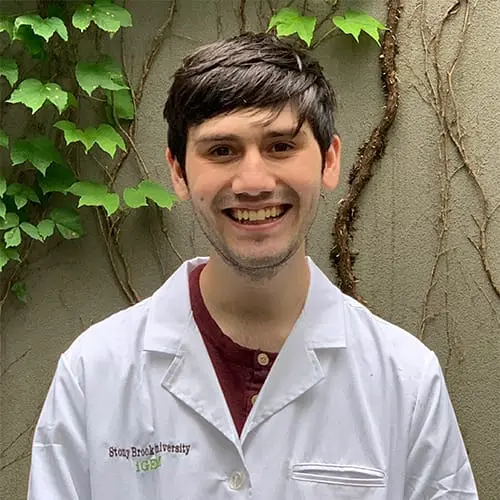


I grew up in Berkeley, California, and completed my undergraduate education at Barnard College. Currently, I am a MD/PhD student at Albert Einstein College of Medicine with the goal of becoming a physician-scientist that bridges the gap between bench and bedside to improve lives through both patient care and scientific discovery.
My work focuses on investigating the impacts of external inflammatory stimuli, like bacterial infection, on the developing blood system. We aim to understand how early perturbations during development may impact blood and immune cells long-term, from early childhood and beyond.
As a PhD candidate, I am combining the live cell-single molecule imaging (Coleman laboratory) and hematopoietic stem cell biology expertise (Steidl laboratory) to elucidate how key hematopoietic transcription factors regulate blood cell development.
Teresa Bowman, PhD
Scuoppo C, Cai B, Ofori K, Scholze H, Kumar R, D’Alessandro A, Basso K, Pasqualucci L, Dalla-Favera R. Repurposing NAMPT Inhibitors for Germinal Center B Cell-Like Diffuse Large B-Cell Lymphoma. Blood Cancer Discov. 2024 Nov 1;5(6):417-427. doi: 10.1158/2643-3230.BCD-24-0020.
Scholze H, Stephenson RE, Reynolds R, Shah S, Puri R, Butler SD, Trujillo-Alonso V, Teater MR, van Besien H, Gibbs-Curtis D, Ueno H, Parvin S, Letai A, Mathew S, Singh A, Cesarman E, Melnick A, Giulino-Roth L. Combined EZH2 and Bcl-2 inhibitors as precision therapy for genetically defined DLBCL subtypes. Blood Adv. 2020 Oct 27;4(20):5226-5231. doi: 10.1182/bloodadvances.2020002580.
Dalton T, Doubrovina E, Pankov D, Reynolds R, Scholze H, Selvakumar A, Vizconde T, Savalia B, Dyomin V, Weigel C, Oakes CC, Alonso A, Elemento O, Pan H, Phillip JM, O’Reilly RJ, Gewurz BE, Cesarman E, Giulino-Roth L. Epigenetic reprogramming sensitizes immunologically silent EBV+ lymphomas to virus-directed immunotherapy. Blood. 2020 May 21;135(21):1870-1881. doi: 10.1182/blood.2019004126.


I grew up in a very small town in Northern New York, on the St. Lawrence River. During my undergraduate studies at the University of Rochester, I became interested in immunology, leading me to pursue a PhD at Columbia University in 2020. Ultimately, I decided to pursue research in hematopoiesis with the goal of understanding how blood production is drastically altered with aging, leading to immune susceptibility in the elderly.
My research project aims to understand the role of epigenetic drift in the dysregulated blood production that accompanies hematopoietic stem cell aging. By understanding how the epigenome changes across the lifespan, we hope to investigate whether modification of the epigenome in aged hematopoietic stem cells may restore youthful blood production.
Emmanuelle Passegué


I grew up in Long Island, and I am pursuing a PhD in biomedical engineering. I was always interested in the “why” of how something worked, so research was a natural step for me.
Benign prostatic hyperplasia (BPH) is characterized by an increase of growth in epithelial cells due to nonmalignant proliferation. By combining synthetic biology approaches with computational modeling, I aim to uncover predictive explanations of BPH pathogenesis and progression.
Dr. Gábor Balázsi


I am originally from Queens, NY and I chose the path of becoming a researcher because I realized my passion for scientific exploration during my undergraduate studies at SUNY Geneseo. I enjoy making new discoveries and feel my skills and efforts would be best put forth into research to make a beneficial impact in other people’s lives.
I am currently working on a new project focused on investigating the mechanisms through which PI3 kinase inactivation leads to impaired hematopoietic stem cell (HSC) differentiation and myelodysplasia. To examine this, I am studying how PI3 kinase inactivation regulates RNA splicing in HSCs, as well as characterizing a new conditional knockout mouse model of PI3 kinase in HSCs.
Dr. Kira Gritsman
Ramnauth, A. D., Maynard, K. R., Kardian, A. S., Phan, B. N., Tippani, M., Rajpurohit, S., … & Martinowich, K. (2022). Induction of Bdnf from promoter I following electroconvulsive seizures contributes to structural plasticity in neurons of the piriform cortex. Brain Stimulation, 15(2), 427-433.
Gurska LM, Okabe R, Schurer A, Tong MM, Soto M, Choi D, Ames K, Glushakow-Smith S, Montoya A, Tein E, Miles LA, Cheng H, Hankey-Giblin P, Levine RL, Goel S, Halmos B, Gritsman K. Crizotinib Has Preclinical Efficacy in Philadelphia-Negative Myeloproliferative Neoplasms. Clin Cancer Res. 2023 Mar 1;29(5):943-956. doi: 10.1158/1078-0432.CCR-22-1763. PMID: 36537918; PMCID: PMC9992133.
Maynard, K., Hobbs, J., Sukumar, M., Kardian, A., Jimenez, D., Schloesser, R., and Martinowich, K. (2018). “Electroconvulsive seizures influence dendritic spine morphology and BDNF expression in a neuroendocrine model of depression.” Brain Stimulation.
Maynard, K., Hobbs, J., Sukumar, M., Kardian, A., Jimenez, D., Schloesser, R., & Martinowich, K. (2017). “Bdnf mRNA splice variants differentially impact CA1 and CA3 dendrite complexity and spine morphology in the hippocampus.” Brain Structure Function.


I became interested in scientific research as an undergraduate at Wesleyan University. Before medical school, I spent two years at The Rockefeller University, where I exposed community of scientists conducting cutting-edge research. As an internal medicine resident at Columbia, I recognized that a career as a physician-scientist would combine my passion for patient care and scientific discovery. Now as a nephrology fellow, I plan to deepen my involvement in translational and basic science research. I am interested in studying the molecular and genetic mechanisms of kidney disease in hopes of improving diagnostic and therapeutic options for patients.
My major research focus during the next two years will be uncovering novel molecular mechanisms that underly the relationship between inflammation and volume regulation. In particular I will study ZFP36, an mRNA binding protein that is known for degrading pro-inflammatory mRNAs and which has unexpectedly been identified as potential regulator of fluid balance. My research seeks to identify the kidney targets of ZFP36 and the molecular mechanisms by which it co-regulates volume and inflammation.
Krzysztof Kiryluk, MD & Jonathan Barasch, MD, PhD
Arace, J., Flores, V., Monaghan, T., Robins, D., Karanikolas, N., Winer, A., & Weiss, J. (2020). Rates of clinically significant prostate cancer in African Americans increased significantly following the 2012 US Preventative Services Task Force recommendation against prostate specific antigen screening: A Single Institution Retrospective Study. International Journal of Clinical Practice, 74(2), e13447.
Oh, S.J., Cheng, J., Jang, J.H., Arace, J., Jeong, M., Shin, C.H., Park, J., Jin, J., Greengard, P., & Oh, Y.S. (2020). Hippocampal mossy cell involvement in behavioral and neurogenic responses to chronic antidepressant treatment. Molecular Psychiatry, 25(6), 1215-1228.
Arnone, J.T., Arace, J.R., Soorneedi, A.R., Citino, T.T., Kamitaki, T.L., & McAlear, M.A. (2014). Dissecting the cis and trans elements that regulate adjacent-gene coregulation in Saccharomyces cerevisiae. Eukaryotic Cell, 13(6), 738-748.
Arnone, J.T., Robbins-Pianka, A., Arace, J.R., Kass-Gergi, S., & McAlear, M.A. (2012). The adjacent positioning of co-regulated gene pairs is widely conserved across eukaryotes. BMC Genomics, 13, 546.


I was born in Nigeria, where I grew up with my six siblings. I became fascinated by science during my days as a secondary school student, thanks to my chemistry and biology teachers as well as my eldest sister who is a professor of physics. After secondary school, I proceeded to receive degrees in pharmacy, and pharmacology and toxicology from the Universities of Jos and Benin, Nigeria, respectively. In 2019, I moved to the USA for a doctorate degree in experimental therapeutics and pharmacology at the University of Mississippi Medical Center, where my research investigated the role of insulin resistance and inflammation during the progression of renal injury associated with childhood obesity. My training as a pharmacist and pharmacologist has instilled in me a passion for biomedical research, especially in the areas of metabolic and kidney diseases. My ultimate ambition is to become an independent scientist and principal investigator whose research will contribute to the development of cures for metabolic dysfunction-associated kidney diseases.
Ekperikpe US, Daehn IS. Integrity of the Glomerular Filtration Barrier: The Impact of Adhesion G-Protein-Coupled Receptor F5 on Glomerular Endothelial Cells. J Am Soc Nephrol. 2024 Oct 1;35(10):1303-1305. doi: 10.1681/ASN.0000000000000479. Epub 2024 Aug 29. PMID: 39207847; PMCID: PMC11452130.
Ekperikpe US, Daehn IS. Aging kidneys reveal underlying mechanisms of endothelial dysfunction. Kidney Int. 2024 Sep;106(3):356-358. doi: 10.1016/j.kint.2024.06.020. PMID: 39174195; PMCID: PMC11670792.
Korsmo HW, Ekperikpe US, Daehn IS. Emerging Roles of Xanthine Oxidoreductase in Chronic Kidney Disease. Antioxidants (Basel). 2024 Jun 12;13(6):712. doi: 10.3390/antiox13060712. PMID: 38929151; PMCID: PMC11200862.
Ekperikpe US, Mandal S, Bhopatkar AA, Shields CA, Coley CA, Chambers CL, Johnson TD, Cornelius DC, Williams JM. Abatacept Decreases Renal T-cell Infiltration and Renal Inflammation and Ameliorates Progressive Renal Injury in Obese Dahl Salt-sensitive Rats Before Puberty. J Cardiovasc Pharmacol. 2024 Jun 1;83(6):635-645. doi: 10.1097/FJC.0000000000001565. PMID: 38547515.
Ekperikpe US, Mandal S, Holt SJ, Daniels JK, Johnson TD, Cooper JS, Safir SM, Cornelius DC, Williams JM. Metformin reduces insulin resistance and attenuates progressive renal injury in prepubertal obese Dahl salt-sensitive rats. Am J Physiol Renal Physiol. 2023 Sep 1;325(3):F363-F376. doi: 10.1152/ajprenal.00078.2023. Epub 2023 Jul 27. PMID: 37498548; PMCID: PMC10639024.
Daehn IS, Ekperikpe US, Stadler K. Redox regulation in diabetic kidney disease. Am J Physiol Renal Physiol. 2023 Aug 1;325(2):F135-F149. doi: 10.1152/ajprenal.00047.2023. Epub 2023 Jun 1. PMID: 37262088; PMCID: PMC10393330.
Poudel B, Ekperikpe US, Mandal S, Wilson GE, Shields CA, Cornelius DC, Williams JM. Chronic treatment with IL-25 increases renal M2 macrophages and reduces renal injury in obese Dahl salt-sensitive rats during the prepubescent stage. Am J Physiol Renal Physiol. 2023 Jul 1;325(1):F87-F98. doi: 10.1152/ajprenal.00209.2022. Epub 2023 May 11. PMID: 37167270; PMCID: PMC10292980.
Wang X, Shields CA, Ekperikpe U, Amaral LM, Williams JM, Cornelius DC. VASCULAR AND RENAL MECHANISMS OF PREECLAMPSIA. Curr Opin Physiol. 2023 Jun;33:100655. doi: 10.1016/j.cophys.2023.100655. Epub 2023 Mar 2. PMID: 37009057; PMCID: PMC10062189.
doi: 10.1152/ajprenal.00209.2022. Epub 2023 May 11. PMID: 37167270; PMCID: PMC10292980.
Ekperikpe US, Poudel B, Shields CA, Mandal S, Cornelius DC, Williams JM. Neutralizing MIP3α Reduces Renal Immune Cell Infiltration and Progressive Renal Injury in Young Obese Dahl Salt-Sensitive Rats. J Pharmacol Exp Ther. 2023 Mar;384(3):445-454. doi: 10.1124/jpet.122.001298. Epub 2022 Dec 5. PMID: 36507846; PMCID: PMC9976792.
Poudel B, Shields CA, Ekperikpe US, Brown AK, Travis OK, Maury JC, Fitzgerald S, Smith SV, Cornelius DC, Williams JM. The SSLepR mutant rat represents a novel model to study obesity-induced renal injury before puberty. Am J Physiol Regul Integr Comp Physiol. 2022 Apr 1;322(4):R299-R308. doi: 10.1152/ajpregu.00179.2021. Epub 2022 Feb 2. PMID: 35107024; PMCID: PMC8917907.
Brown AK, Nichols A, Coley CA, Ekperikpe US, McPherson KC, Shields CA, Poudel B, Cornelius DC, Williams JM. Treatment With Lisinopril Prevents the Early Progression of Glomerular Injury in Obese Dahl Salt-Sensitive Rats Independent of Lowering Arterial Pressure. Front Physiol. 2021 Dec 17;12:765305. doi: 10.3389/fphys.2021.765305. PMID: 34975523; PMCID: PMC8719629.
Shields CA, Poudel B, McPherson KC, Brown AK, Ekperikpe US, Browning E, Sutton L, Cornelius DC, Williams JM. Treatment With Gemfibrozil Prevents the Progression of Chronic Kidney Disease in Obese Dahl Salt-Sensitive Rats. Front Physiol. 2020 Sep 18;11:566403. doi: 10.3389/fphys.2020.566403. PMID: 33071820; PMCID: PMC7533555.
Poudel B, Shields CA, Brown AK, Ekperikpe U, Johnson T, Cornelius DC, Williams JM. Depletion of macrophages slows the early progression of renal injury in obese Dahl salt-sensitive leptin receptor mutant rats. Am J Physiol Renal Physiol. 2020 Jun 1;318(6):F1489-F1499. doi: 10.1152/ajprenal.00100.2020. Epub 2020 May 11. PMID: 32390513; PMCID: PMC7311704.
Ekperikpe, US., Owolabi, OJ., Olapeju, BI. Evaluation of the Effects of Citrus paradisi (Rutaceae) Fruit Juice on Electrolyte, Hepatic, Hematological, and Histologic Derangements in Streptozotocin-induced Diabetic Rats. Nigerian Journal of Pharmaceutical and Applied Sciences Research 2019: 8(1), 1-15
Ekperikpe US, Owolabi OJ, Olapeju BI. Effects of Parkia biglobosa aqueous seed extract on some biochemical, haematological and histopathological parameters in streptozotocin induced diabetic rats. J Ethnopharmacol. 2019 Jan 10;228:1-10. doi: 10.1016/j.jep.2018.09.016. Epub 2018 Sep 12. PMID: 30218811.


I am a Hematology/Oncology fellow at Columbia University Medical Center pursuing a career as a physician-scientist. I grew up in White Plains, New York and after college, immersed myself in bench research aimed at understanding kidney-centered mechanisms of iron regulation. Motivated to translate bench discoveries to patient care, I earned my MD in Buffalo and returned to Columbia for residency and fellowship, where I continue on a research track.
My long-term research goal is to unravel fundamental epigenetic mechanisms that govern normal and abnormal hematopoiesis, and to translate this understanding into developing novel diagnostics and therapies for blood disorders. My current project focuses on using nanopore-based long-read sequencing to comprehensively map methylation patterns and chromatin accessibility in normal and dysregulated hematopoiesis. By correlating these epigenomic profiles with outcomes in patients with myelodysplastic syndrome treated with hypomethylating agents, I aim to identify epigenetic biomarkers that predict therapeutic response and ultimately inform treatment.
Barasch, J.*, Deng, R.*, Hollmen, M.*, Hod, E. A., Rupert, P. B., Abergel, R. J., Allred, B. E., Xu, K., Darrah, S. F., Tekabe, Y., Perlstein, A., Wax, R., Bruck, E., Stauber, J., Corbin, K. A., Buchen, C., Slavkovich, V., Graziano, J., Spitalnik, S. L., Bao, G., … Qiu, A. (2016). Disposal of iron by a mutant form of lipocalin 2. Nature communications, 7, 12973. *equal contribution PMID: 27796299
Paragas, N., Kulkarni, R., Werth, M., Schmidt-Ott, K. M., Forster, C., Deng, R., Zhang, Q., Singer, E., Klose, A. D., Shen, T. H., Francis, K. P., Ray, S., Vijayakumar, S., Seward, S., Bovino, M. E., Xu, K., Takabe, Y., Amaral, F. E., Mohan, S., Wax, R., … Barasch, J. (2014). α-Intercalated cells defend the urinary system from bacterial infection. The Journal of clinical investigation, 124(7), 2963–2976. PMID: 24937428
Lopez-Rivera, E., Liu, Y. P., Verbitsky, M., Anderson, B. R., Capone, V. P., Otto, E. A., Yan, Z., Mitrotti, A., Martino, J., Steers, N. J., Fasel, D. A., Vukojevic, K., Deng, R., Racedo, S. E., Liu, Q., Werth, M., Westland, R., Vivante, A., Makar, G. S., Bodria, M., … SannaCherchi, S. (2017). Genetic Drivers of Kidney Defects in the DiGeorge Syndrome. The New England journal of medicine, 376(8), 742– 754. PMID: 28121514
Xu, K., Rosenstiel, P., Paragas, N., Hinze, C., Gao, X., Huai Shen, T., Werth, M., Forster, C., Deng, R., Bruck, E., Boles, R. W., Tornato, A., Gopal, T., Jones, M., Konig, J., Stauber, J., D’Agati, V., Erdjument-Bromage, H., Saggi, S., Wagener, G., … Barasch, J. (2017). Unique Transcriptional Programs Identify Subtypes of AKI. Journal of the American Society of Nephrology : JASN, 28(6), 1729– 1740. PMID: 28028135
Abdul-Aziz, R., Deng, R., Liu, L., Tarsi, S., Waz, W. R., & Wu, X. (2021). Complete Renal Recovery in Pediatric Patient with C3 Glomerulonephritis: A Case Report. Case reports in nephrology and dialysis, 11(3), 261–269.
Mandloi, S., Falls, Z., Deng, R., Samudrala, R., & Elkin, P. L. (2020). Association of C>U RNA Editing with Human Disease Variants. Studies in health technology and informatics, 270, 1205–1206. PMID: 32570581


I earned my PhD in Molecular and Cellular Physiology from UC Davis in 2008, where I studied bicarbonate secretion across the oviduct. I then completed two postdoctoral fellowships focusing on the regulation of sodium and chloride transport in the renal collecting duct, receiving funding from the American Heart Association and presenting at national conferences. Inspired by physician-scientist mentors, I transitioned to medicine in 2017, and earned my M.D. From the Albert Einstein College of Medicine in 2021. After medical school, I was fortunate to matc into the ABIM research pathway at Mount Sinai for Internal Medicine residency, where I stayed for my Nephrology fellowship training. During residency, I developed a strong interest in data science and machine learning and joined Dr. Girish Nadkarni’s lab, contributing to two original publications. I began the research phase of my fellowship in Fall 2024, where I aim to integrate computational tools with clinical insights to advance precision medicine in nephrology.
Dellepiane, S., Paranjpe, I., Rajagopal, M., Kamat, S., O’Hagan, R., Gulamali, F., Rein, J. L., Charney, A. W., Do, R., Coca, S., Glicksberg, B. S., & Nadkarni, G. N. (2023). Cannabis Use and CKD: Epidemiological Associations and Mendelian Randomization. Kidney Med, 5(2), 100582. https://doi.org/10.1016/j.xkme.2022.100582
Hou, J., Rajagopal, M., & Yu, A. S. (2013). Claudins and the kidney. Annu Rev Physiol, 75, 479-501. https://doi.org/10.1146/annurev-physiol-030212-183705
Jayaraman, P., Rajagopal, M., Paranjpe, I., Suarez-Farinas, M., Liharska, L., Thompson, R., Del Valle, D. M., Beckmann, N., Lund, A. N., Gownivaripally, P., Oh, W., Gulamali, F. F., Kauffman, J., Gonzalez-Kozlova, E., Dellepiane, S., Vasquez-Rios, G., Vaid, A., Jiang, J., Fox, B.,…Nadkarni, G. N. (2025). Peripheral Transcriptomics in Acute and Long-Term Kidney Dysfunction in SARS-CoV2 Infection. Kidney360. https://doi.org/10.34067/KID.0000000727
Kakade, V. R., Tao, S., Rajagopal, M., Zhou, X., Li, X., Yu, A. S., Calvet, J. P., Pandey, P., & Rao, R. (2016). A cAMP and CREB-mediated feed-forward mechanism regulates GSK3beta in polycystic kidney disease. J Mol Cell Biol, 8(6), 464-476. https://doi.org/10.1093/jmcb/mjw022
Kathpalia, P. P., Charlton, C., Rajagopal, M., & Pao, A. C. (2011). The natriuretic mechanism of Gamma-Melanocyte-Stimulating Hormone. Peptides, 32(5), 1068-1072. https://doi.org/10.1016/j.peptides.2011.02.006


I am a physician-scientist in the final year of my nephrology fellowship at the Icahn School of Medicine at Mount Sinai, where I divide my time between caring for patients with kidney disease and conducting lab-based research. I was drawn to this path because it allows me to make a difference for individual patients at the bedside, while also contributing to broader scientific progress in the lab.
Born and raised in New York City, I completed my undergraduate degree at the University of St. Andrews, in Scotland, followed by medical school at SUNY Downstate College of Medicine. I completed my residency training at Mount Sinai, where I am also currently pursuing a Master of Science in Biomedical Sciences.
My research focuses on the connection between albuminuria and cardiac disease in patients with glomerular disorders. Currently, I am investigating the potential role of kidney-derived exosomes in driving the development of heart failure using a novel mouse model of focal segmental glomerulosclerosis.
He X, Rodriguez Ballestas E, Zeng L, Zhang T, McEvoy CM, Misra PS, Yang W, Ki V, Wong JS, Meliambro K, Ray J, de Cos M, Fang Y, Krizova A, How I, Rosales IA, Colvin RB, He C, Campbell KN, and Yuen DA. Podocyte YAP/TAZ hyperactivation is a driver of glomerular epithelial proliferative diseases in mice and humans. Sci. Transl. Med. May 2025.
de Cos M, Mosoyan G, Chauha K, Troost J, Wong JS, Lefferts S, Morgan P, Meliambro K, Egerman M, Ray J, Perlman A, Moledina D, Coca S, and Campbell KN. Urinary Plasminogen as a Marker of Disease Progression in Human Glomerular Disease. Am J Kidney Dis. 2024 Mar 5:s0272-6386(24)—630-9. PMID: 38452919.
Ray J, Smith S, Meliambro K, Salem F, and Campbell KN. IgA Nephropathy and Secondary FSGS in a Patient with High-Risk Apolipoprotein L1 (APOL1) Genotype. Kidney Int Rep. 7(11):2530-2533. 2022. PMID: 36531877.
Shaikh A, Ray J, and Campbell KN. The role of finerenone in the treatment of diabetic nephropathy: patient selection and clinical perspectives. Ther Clin Risk Manag. 18:753-760. 2022. PMID: 35937973.
Maldonado D, Ray J, Lin X, Salem F, Brown M and Bansal I. COVAN leading to ESKD despite minimal COVID symptoms. J Investig Med High Impact Case Rep. 2022. 10. PMID: 35466742.
Ray J, Srinath R, and Mechanick JI. The negative impact of routine, dietary pattern, and physical activity on obesity and dysglycemia during the COVID-19 pandemic. Am J Lifestyle Med. 2022. 17(2):219-230. PMID: 36883128.
Basgen JM, Wong JS, Ray J, Nicholas SB, and Campbell KN. Podocyte foot process effacement precedes albuminuria and glomerular hypertrophy in CD2-associated protein deficient mice. Front Med. 2021. 8:745319. PMID: 34568396.
Luther JM, Ray J, Wei D, Goethe J, Hannah L, Manning R, Peng D, Nian H, Yu C, Mashayekhi M, Gamboa J and Brown NJ. GSK2256294 decreases soluble epoxide hydrolase activity in plasma, muscle and adipose and reduces F2-isoprostanes but does not alter insulin sensitivity in humans. Hypertension. 2021. 78(4):1092-1102. PMID: 34455816.
Ray J, Kumar S, Laor D, Shereen N, Nwamaghinna F, Thomson A, Perez J, Soni L and McFarlane SI. Effects of Stevia rebaudiana on glucose homeostasis, blood pressure and inflammation: a critical review of past and current research evidence. Int J Clin Res Trials. 2020. 5:142. PMID: 32149202.
Ray J, Mahmood A, Dogar M, Guo J, Nwamaghinna F, Salciccioli L, and McFarlane SI. Simultaneous cardiotoxicity and neurotoxicity associated with 5-fluorouracil containing chemotherapy: a case report and literature review. Am J Med Case Rep. 2020. 8(3):73-75. PMID: 32149185
Meliambro K, Wong JS, Ray J, Calizo R, Towne S, Cole B, Gordon R, Kaufman L, He JC, Azeloglu E, and Campbell KN. The hippo pathway regulator KIBRA promotes podocyte injury by inhibiting YAP signaling and disrupting actin cytoskeleton dynamics. J Biol Chem. 2017. 292(51):21137-21148. PMID: 28982981.
Meliambro K, Wong JS, Ray J, Calizo R, Towne S, Cole B, Gordon R, Kaufman L, He JC, Azeloglu E, and Campbell KN. The hippo pathway regulator KIBRA promotes podocyte injury by inhibiting YAP signaling and disrupting actin cytoskeleton dynamics. J Biol Chem. 2017. 292(51):21137-21148. PMID: 28982981.
Wong JS, Meliambro K, Ray J, and Campbell KN. Hippo signaling in the kidney: the good and the bad. Am J Renal Physiol. 2016. 311(2):241-8. PMID: 27194720.


I am originally from China and earned my Medical Degree from Capital Medical University in 2016. I later completed my PhD in Biomedical Sciences at the Icahn School of Medicine at Mount Sinai in 2024. My research interests were initially centered on cardiovascular diseases. However, during the journey of my PhD training, I became deeply fascinated by organ crosstalk and developed a strong interest in cardio-renal diseases. My career goal is to become a physician-scientist.
My research focuses on investigating EndMT in cardiorenal diseases, primarily using mouse and pig models. I aim to explore the therapeutic potential of targeting EndMT across various cardiorenal conditions.
Jason Kovacic, MD PhD
Xu Y, Korayem A, Cruz-Solbes AS, Chandel N, Sakata T, Mazurek R, Mavropoulos SA, Kariya T, Aikawa T, Yamada KP, D’Escamard V, V’Gangula B, Baker AH, Ma L, Björkegren JLM, Fuster V, Boehm M, Fish KM, Tadros R, Ishikawa K, Kovacic JC. Inhibition of endothelial-to-mesenchymal transition in a large animal preclinical arteriovenous fistula model leads to improved remodelling and reduced stenosis. Cardiovasc Res. 2024 Nov 25;120(14):1768-1779. doi: 10.1093/cvr/cvae157. PMID: 39056563; PMCID: PMC11587554.
d’Escamard V, Kadian-Dodov D, Ma L, Lu S, King A, Xu Y, Peng S, V Gangula B, Zhou Y, Thomas A, Michelis KC, Bander E, Bouchareb R, Georges A, Nomura-Kitabayashi A, Wiener RJ, Costa KD, Chepurko E, Chepurko V, Fava M, Barwari T, Anyanwu A, Filsoufi F, Florman S, Bouatia-Naji N, Schmidt LE, Mayr M, Katz MG, Hao K, Weiser-Evans MCM, Björkegren JLM, Olin JW, Kovacic JC. Integrative gene regulatory network analysis discloses key driver genes of fibromuscular dysplasia. Nat Cardiovasc Res. 2024 Sep;3(9):1098-1122. doi: 10.1038/s44161-024-00533-w. PMID: 39271816.
Hall IF, Kishta F, Xu Y, Baker AH, Kovacic JC. Endothelial to mesenchymal transition: at the axis of cardiovascular health and disease. Cardiovasc Res. 2024 Mar 14;120(3):223-236. doi: 10.1093/cvr/cvae021. PMID: 38385523; PMCID: PMC10939465.
Xu Y, Kovacic JC. Endothelial to Mesenchymal Transition in Health and Disease. Annu Rev Physiol. 2023 Feb 10;85:245-267. doi: 10.1146/annurev-physiol-032222-080806. PMID: 36266259.
Ma L, Bryce NS, Turner AW, Di Narzo AF, Rahman K, Xu Y, Ermel R, Sukhavasi K, d’Escamard V, Chandel N, V’Gangula B, Wolhuter K, Kadian-Dodov D, Franzen O, Ruusalepp A, Hao K, Miller CL, Björkegren JLM, Kovacic JC. The HDAC9-associated risk locus promotes coronary artery disease by governing TWIST1. PLoS Genet. 2022 Jun 17;18(6):e1010261. doi: 10.1371/journal.pgen.1010261. PMID: 35714152; PMCID: PMC9246173.
Lecce L*, Xu Y*, V’Gangula B, Chandel N, Pothula V, Caudrillier A, Santini MP, d’Escamard V, Ceholski DK, Gorski PA, Ma L, Koplev S, Bjørklund MM, Björkegren JL, Boehm M, Bentzon JF, Fuster V, Kim HW, Weintraub NL, Baker AH, Bernstein E, Kovacic JC. Histone deacetylase 9 promotes endothelial-mesenchymal transition and an unfavorable atherosclerotic plaque phenotype. J Clin Invest. 2021 Aug 2;131(15):e131178. doi: 10.1172/JCI131178. PMID: 34338228; PMCID: PMC8321575. *Equal contribution.


I grew up in Delhi, India where I completed my schooling and undergrad degree. During my high school I learned about Mendelian inheritance and transcription of genes or, in other words, regulation of gene expression which was quiet intriguing. During the academic training for master’s, I developed a deeper understanding of the basic concepts in the field of genetics, molecular and cellular biology. What interested me was the concept that virtually all cells contain the same genetic material but not all genes are expressed in a given cell type owing to their epigenetic regulation.
My research focused on the characterization of antisense ncRNAs present during vertebrate development. We took a computational biology approach and analyzed pre-existing RNA-seq, CAGE-seq and ChIP-seq datasets to categorize the antisense – protein-coding pairs. My postdoctoral work involves building up on my knowledge of genetics and chromatin biology and addressing key questions relating to three-dimensional organization of the genome in the context of development.
Prof. James Bieker
Pillay S, Takahashi H, Carninci P, Kanhere A. Antisense RNAs during early vertebrate development are divided in groups with distinct features. Genome Res. 2021; 31(6):995-1010. Cited 9 times.
Ramilowski JA, Yip CW, Agrawal S, et al. Functional annotation of human long noncoding RNAs via molecular phenotyping. Genome Res. 2020;30(7):1060-1072. Cited 104 times
Chen X*, Pillay S*, Lohmann F and Bieker J. Association of Ddx5/p68 protein with the upstream erythroid enhancer element (EHS1) of the Klf1 gene. bioRxiv 743435; doi: https://doi.org/10.1101/743435. *co-first authors.


I grew up in the metro Detroit area and went to college and medical school in New York. I became interested in pediatric nephrology during medical school and developed a specific interest in the neonatal population during residency. I love that research allows me to try and improve the quality and standard of care that my patients receive.
My research involves using EMR data to look at the incidence of missed diagnoses of acute kidney injury in preterm infants admitted to the neonatal intensive care unit, identify clinical or demographic characteristics that may put patients at risk of having a missed diagnoses of AKI, and evaluate how clinical decision making is affected by the diagnosis of AKI.
Pamela Good, MD and Sumit Mohan, MD MPH


I am a postdoctoral fellow in the lab of Dr. Sandeep Mallipattu at Stonybrook University. I was born in Moscow, in the former USSR, and came to the United States when I was 8 years old – after that living mostly in NYC and the tri-state area. I love research precisely because the failure rate is astronomically high, so it’s a challenge to come up with new questions and approaches to seemingly intractable problems. I chose biomedical research in particular because it keeps me grounded to the core ambition of this pursuit, which is to devise novel ways of tackling human disease pathogenesis.
Our group is focused on identifying the core molecular aberrations in proliferative glomerular diseases such as rapidly progressive glomerulonephritis (RPGN) and cellular/collapsing subtypes of focal segmental glomerulosclerosis (FSGS). Parietal epithelial cells that line Bowman’s capsule in the kidney glomerulus play a key part in disease pathogenesis and we are therefore committed to understanding their basal and disease-associated epigenomic and signaling cascades.
Dr. Sandeep Mallipattu
Cortes-Canteli M., Paul J., Norris E.H., Bronstein R., Ahn H.J., Zamolodchikov D., Bhuvanendran S., Fenz K.M., Strickland S. Fibrinogen and β-Amyloid association alters thrombosis and fibrinolysis: A possible contributing factor to Alzheimer’s disease. Neuron. 2010;66:695–709. doi: 10.1016/j.neuron.2010.05.014.
Gegenhuber B., Wu MV., Bronstein R., Tollkuhn, J. Gene regulation by gonadal hormone receptors underlies brain sex differences. Nature. 2022 Jun;606(7912):153-159.
Pace, J.*, Bronstein, R.*, Guo, Y., Yang, Y., Estrada, C., Gujarati, N., Salant, D., Haley, J., Bialkowska, A., Yang, V., He, J., and Mallipattu, S. Podocyte-specific KLF4 is required to maintain parietal epithelial cell quiescence in the kidney. Science Advances. 2021 10.1126/sciadv.abg6600 *These authors contributed equally.
Bronstein, R., Pace J, Gowthaman, Y., Salant, DJ., Mallipattu, SK. Podocyte-Parietal Epithelial Cell Interdependence in Glomerular Development and Disease. JASN. 2023 Feb 16. doi: 10.1681/ASN.0000000000000104. Epub ahead of print. PMID: 36800545. 10.1126/sciadv.abg6600 *These authors contributed equally.


I am Persian but I lived in aa beautiful city in Italy called Siena. I gained two Master’s degrees in nanotechnology and biotechnology and then PhD in medical Biotechnology during which I worked on designing vaccines. At a very young age I became deeply interested in science by joining summer schools in biology. I have always been interested in understanding mechanisms of diseases and hopefully to find prevention and treatments to diseases with no cure. I moved to United States in 2020 during Covid lockdown and I was fortunate to meet my PI and joined kidney research at Stony Brook Medicine!
There are currently no therapies available to slow or reverse AKI, which may also lead to fibrosis. During AKI, metabolic pathways become defective which leads to accumulation of substrates in the cell. Defective BCAA catabolism may cause PT cells injury in two possible ways, loss of cell energy source and activation of m-TORC1 signaling through accumulation of leucine. I am working on a way to activate BCAA metabolism so PT cells may be rescued from injury, to determine potential beneficial effects in AKI and fibrosis.
Dr. Sian Piret
Piret SE, Khan S, Fairuz F, Gholami S, Davis M, Kim CK, Espinoza M, Foster D, Kellum JA, Ahmad S, Kalogeropoulos AP, Mallipattu SK. Endotoxemia Correlates with Kidney Function and Length of Stay in Critically Ill Patients. Blood Purif. 2024;53(1):30-39. doi: 10.1159/000534107. Epub 2023 Nov 2. PMID: 37918364 10.1126/sciadv.abg6600 *These authors contributed equally.
Moscardini IF, Santoro F, Carraro M, Gerlini A, Fiorino F, Germoni C, Gholami S, Pettini E, Medaglini D, Iannelli F, Pozzi G. Immune Memory After Respiratory Infection With Streptococcus pneumoniae Is Revealed by in vitro Stimulation of Murine Splenocytes With Inactivated Pneumococcal Whole Cells: Evidence of Early Recall Responses by Transcriptomic Analysis. Front Cell Infect Microbiol. 2022 Jun 20;12:869763. doi: 10.3389/fcimb.2022.869763. PMID: 35795182; PMCID: PMC9251119
Gholami S, Goodarzvand Chegini K, Gheibi N, Mokhtarian K, Mohamadi M, Falak R. Cloning, expression, and spectral analysis of mouse betatrophin. Med J Islam Repub Iran. 2017 Dec 18;31:102. doi: 10.14196/mjiri.31.102. PMID: 29951403; PMCID: PMC6014755.
Gholami S, Gheibi N, Falak R, Goodarzvand Chegini K. Cloning, Expression, Purification and CD Analysis of Recombinant Human Betatrophin. Rep Biochem Mol Biol. 2018 Apr;6(2):158-163. PMID: 29765998; PMCID: PMC5941129.. Reports of Biochemistry & Molecular Biology, Vol.6, No.2, Apr
Mokhtarian K, Akhlaghi L, Meamar AR, Razmjou E, Manouchehri Naeini K, Gholami S, Najafi Samei M, Falak R. Serodiagnosis of fasciolosis by fast protein liquid chromatography-fractionated excretory/secretory antigens. Parasitol Res. 2016 Aug;115(8):2957-65. doi: 10.1007/s00436-016- 5049-7. Epub 2016 Apr 30. PMID: 27130320.